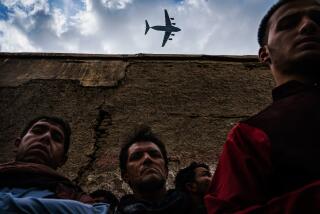Critics: White House slows war for political reasons
(RealVideo and QuickTime)
- Share via
WASHINGTON — In a distant echo of Vietnam, some leading conservatives are quietly questioning whether the Bush administration is allowing its political goals in Afghanistan to excessively shape military strategy.
After 10 days of bombing, the fear is that the administration is restraining its attacks on Taliban forces, especially around the capital, Kabul, until a coalition can be assembled to replace the fundamentalist Islamic regime if it is driven from power.
“Most Republicans want to give the administration the benefit of the doubt,” says Gary Schmitt, executive director of the Project for a New American Century, a hawkish think tank in Washington. “(But) I think there is a very quiet but nonetheless very real sense of unease about (the military campaign in Afghanistan) seeming to take a little bit longer than it should.”
Added a former senior Republican official experienced in the region: “I think it’s a very serious problem. I think the view of most of the military people is that the objective is to win a victory over the Taliban.... I think that’s what the military would like to do, and they are getting a lot of political interference.”
These complaints, which activists say are rumbling through Congress and parts of the Pentagon, reprise the long-standing charge from conservatives and many in the military that political considerations hampered the U.S. effort in Vietnam. Secretary of State Colin L. Powell, during his military career, was among the most forceful in insisting that the United States should never again fight “a halfhearted half-war,” as he put it in his memoirs.
A low buzz of criticism on the right is accusing Powell of endorsing just such an approach in Afghanistan as he and other U.S. officials work to assemble a new governing coalition. Powell’s visit to Pakistan this week seemed to hasten that process, with reports indicating that the outline of an interim post-Taliban government is beginning to emerge.
The administration has publicly denied that it is calibrating its attacks on the Taliban forces, particularly the troops dug in north of Kabul, to prevent the Northern Alliance alone from taking the capital and establishing a new government.
But many experts in the region say such a strategy would be appropriate because the Northern Alliance has too narrow a base of support to consolidate control over the entire country. The group has appeared to acknowledge that point by entering into discussions to form a broader opposition coalition.
“The goal is to work for a stable Afghanistan, so three years from now we are not faced with the same problem again,” says New York University professor Barnett R. Rubin, an expert on Afghanistan.
This debate is occurring amid the fog of war. Outside the Pentagon, few know for certain which targets have been struck and whether operational considerations can explain why some have been hit more than others.
But leaders of the Northern Alliance, in Washington and Afghanistan, have repeatedly said that the pattern of U.S. attacks seems to be encouraging them to move west to attack Taliban forces around Mazar-e-Sharif, in the north-central part of the country, rather than south, to confront the Taliban forces defending Kabul.
Privately, senior administration officials have cautioned that even with more targeted U.S. air support, the Northern Alliance is not nearly as capable of taking Kabul as its representatives suggest.
At a news briefing Monday, Defense Secretary Donald H. Rumsfeld said there had been no “conscious” effort to discourage a Northern Alliance offensive on Kabul. He said U.S. air strikes had not focused on those forces because “we have had less-than-perfect targeting information.”
He added: “I suspect that in the period ahead, that’s not going to be a very safe place to be.” And on Tuesday, Pentagon officials said they had struck the Taliban positions north of Kabul on Monday, as the air campaign intensified.
But officials in the Northern Alliance, and the critics at home, believe the Bush administration has been influenced by a reluctance to create conditions that could allow the rebel forces to advance into Kabul. Pakistan, which has become a key U.S. partner in the region, has repeatedly indicated its opposition to an Afghanistan government led by the Northern Alliance.
Also, the alliance’s components dissolved into a chaotic civil war when they ran Afghanistan from 1992 until 1996. Many U.S. analysts fear they would again prove unable to pacify and unify the country.
The conservatives growing uneasy over the administration strategy don’t dispute that conclusion. But they argue that it is premature to focus on it while the Taliban still has a large force in the field. At this point, they argue, the principal goal should be destroying as much of the Taliban military as possible, regardless of the implications for a possible successor government.
More to Read
Sign up for Essential California
The most important California stories and recommendations in your inbox every morning.
You may occasionally receive promotional content from the Los Angeles Times.














